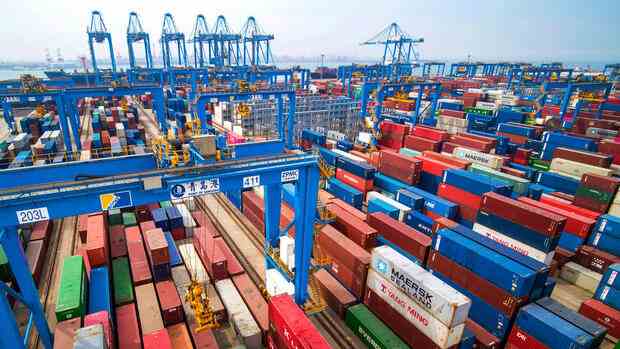Many medium-sized companies remain dependent on the country.
(Photo: dpa)
Dusseldorf With tensions rising globally, many companies are trying to reduce their dependence on China. This is often difficult in practice. A family business owner who has often been to the People’s Republic in recent years reports that he is becoming more self-confident there – that has made him rethink.
It had become clear to him that his trading partners could decide from one day to the next to no longer supply him. Only this year did he take concrete steps in his supply chain. Another entrepreneur confirms this: “In previous years, we lacked the consistent implementation of becoming more independent,” he says. Both want to remain anonymous – because they are still dependent on Chinese suppliers.
A large part of the medium-sized economy is like them. In a survey by the DZ-Bank, which is available exclusively to the Handelsblatt, 36 percent of the decision-makers stated that they were dependent on China for their supply chains – more than in any other country. Central and Eastern Europe followed in second place with exactly one third. The USA, which shares third place with Ukraine, has 15 percent.
Small companies even want to expand relationships
The leading institute of the cooperative banks had asked 1000 managing directors and decision-makers in medium-sized companies about the resilience of their supply chains. The results show that larger companies in this sector in particular are currently trying to make themselves less dependent on China. 16 percent want to withdraw from the country.
Top jobs of the day
Find the best jobs now and
be notified by email.
15 percent of the decision-makers surveyed want to expand the supply relationships again. Among them are mainly smaller companies that turn over five million euros and less a year. The bottom line is that dependency on China is not decreasing.
Uwe Berghaus, board member for corporate customers at DZ Bank, explains the high dependency of the smaller medium-sized companies primarily with the fact that they obtain their products from wholesalers. “This means they have less influence on adjusting their supply chains,” said Berghaus. In addition, it is often difficult for small and medium-sized companies to get used to the price level in Europe: “It is simply more expensive to produce here, even in Eastern Europe.”
Among the larger medium-sized companies surveyed, production in the local markets prevailed, said Berghaus. That shortens the supply chain. Therefore, the companies are currently investing more in their European production, especially in Eastern Europe. “This primarily affects key technologies such as semiconductors or quantum computing.”
>> Read also: China is important for the German economy – the key figure remains under lock and key
If the situation in China continues to deteriorate due to the protests against the corona measures, Berghaus expects the supply chains to come under increasing pressure again. Even if production continued in the factories, transport within the country and shipping would be difficult. “It would be particularly momentous,” said Berghaus, “if the ports were closed again.”
At the end of November there were protests in numerous Chinese cities. After a fire in a house that killed several people, many people took to the streets against the government’s zero-Covid policy.
Two regions are benefiting from the rethinking of German medium-sized companies
So far, it has primarily been the Eastern European countries that have benefited from so-called near-shoring, i.e. the relocation of production facilities to Europe. The survey now shows for the first time that Western European countries are also likely to play a greater role in the future. Every third medium-sized company stated that they want to concentrate more on business with their Western European neighbors in the next five years. Drivers are therefore the safe delivery routes within the EU.
However, many medium-sized companies are also looking to the USA. 15 percent of them intend to intensify their relationships in the next five years. Above all, as the study shows, larger medium-sized companies from the chemical, electrical, mechanical engineering and automotive industries want to produce more there in the future.
More: Dodgy deals in Qatar: where the new supply chain law is failing



